I know what you’re thinking, regarding the title of this post, and it is “no.” You’re thinking maybe I’ve never heard of Raging Bull or Taxi Driver or Goodfellas. You might even be thinking I missed out on The King of Comedy. (If you’re thinking I should see Hugo, you are a troubled soul who should stay away from movie theaters.) In short, you’d like to suggest I go home and get my fuckin’ shine box.
But there are times, like now, the morning after having watched After Hours for the 837th time, when After Hours is, at least briefly, the best movie Scorsese ever made. It’s the funniest bleak movie of all time. And it’s not merely bleak. It’s existentially bleak. I want to write how it’s some kind of beautiful metaphor for something, but I don’t quite know what that something is. The filmmakers didn’t either. The ending in Joseph Minion’s script has Paul Hackett (Griffin Dunne), plastered up in paper-mâché by lonely, basement living artist June (Verna Bloom), stolen by Neil and Pepe (Cheech and Chong), jammed in the back of their truck with their other stolen goods, driven off into night following Pepe’s line, “Art is forever.” Fade to black. The end.
Scorsese knew this couldn’t be the ending. He showed a cut of the movie to friends, to other directors, to anyone and everyone, asking what should happen. They came up with all sorts of weird ideas, including one surreal ending where Paul climbs up into June’s womb. It was director Michael Powell who did what old, wise people do best: see what’s already there, and go with the most obvious solution, in this case, have Paul turn up back at work. Scorsese didn’t like this at first and continued trying to come up with something better. Eventually he realized there was only one ending, and it was Powell’s.
Which the point is, the ending feels absolutely right, even if one can’t put into words what it “means.” It’s an ending you feel rather than think about and assign meaning to. I’m guessing this is what held up Scorsese from seeing how perfect it is. And it is perfect. The movie could end no other way without it feeling in some way incomplete.
I seem to have begun at the ending. I trust I’m not spoiling anything. You have seen After Hours, haven’t you? Not for a long time, perhaps, but that’s why I’m here today writing this. It’s time to see it again. It gets better every time you watch it.
It’s the story of one man’s nightmare night, a man who sees the universe conspiring against him and decides to just go home, yet who finds that no matter how hard he tries, that’s the one thing he can’t do. He does everything right. You never yell at the screen, “You idiot! Why not just do THAT!?” Because he already did whatever that is. It’s gloriously frustrating. Like life. Scorsese apparently had trouble filming certain horrible scenes because he was laughing so hard. He could relate.
Griffen Dunne is so great as Paul. He’s nice, he’s a good guy, and when things go wrong he’s so genuinely frustrated you can’t help but feel for the guy. Even when he blows up at Marcie (Rosanna Arquette, her best role ever?), you’re with him, because holy jeebus is Marcie nuts. I love her instaneous mood swings, her strange tales of six hour rape she slept through most of and her husband’s penchant for crying out “Surrender Dorothy!” during sex (the movie was originally titled Surrender Dorothy), and her half-whispered, paranoid conversations with her roommate (Linda Fiorentino), she of the fabled bagel and cream cheese, plaster of paris paperweights.
Look at Dunne’s expression when he meets Marcie in the diner, she asks him if he’d like to buy one of the paperweights, and he says, “Yes.” You can hear in the pause before the “yes” and the way he says it a lengthy thought process: “A paperweight? You must be joking. Only you are cute, and if I say yes, maybe I can get your number. But do I really want to go down this road with you, random girl in a diner? Well, fuck it, why not.” And so, “Yes.”
Teri Garr and Catherine O’Hara are the other two women Dunne meets, and like Arquette, they dig deep into their small roles to create all too real loons. Admittedly, the movie doesn’t have any sane female characters (although then again, Fiorentino’s Kiki Bridges is perfectly well-adapted, she just lives a different kind of lifestyle, her and her sensitive, knot-enthusiast boyfriend Horst (Will Patton)), but that’s because this is Paul’s story, it’s his nightmare world, and like many men, he’s got some issues with women.
The feel Scorsese imparts through his camera movement and editing is dreamy and haunting and unusually rhythmic. It’s almost like the entire movie is cut to the beat of a song, most notably when Paul goes to the apartment of the bartender (John Heard), clicks on the light, turns off the alarm, flushes the toilet. Strange touches abound, as when Paul comes up the stairs to Kiki’s apartment, he fades out at the bottom of the stairs and fades in at the top, or when she drops the keys and we race down with them as Paul waches them fall. Often Scorsese has the camera follow people’s hands, as they grab matches, hail cabs, turn on lights, or grab a $20 from Kiki’s Munch-like sculpture. Scorsese is well known for his moving camera, but in After Hours it feels especially appropriate to the story of this man trying so hard to stay in motion, to just get home.
After Hours wasn’t a big commercial success when it opened in ’85. Critics liked it. Scorsese showed it at Cannes and won Best Director. Since ’85 it’s become something of a cult classic, as they say. Which just means it’s great and a little bit weird. Wouldn’t it be nice if all movies, bad or great, were a little bit weird? Yes, it would be.
One last thing, weird and great radio story-teller Joe Frank sued the producers when the movie came out for stealing one of his early stories. It was settled and he was paid handsomely, it is said. It’s an eleven minute piece called Lies. If you’re familiar with the movie, give it a listen. Sure enough, screenwriter Minion took this story as his inspiration for the first act of the movie and didn’t bother to change it nearly enough.
|
 |

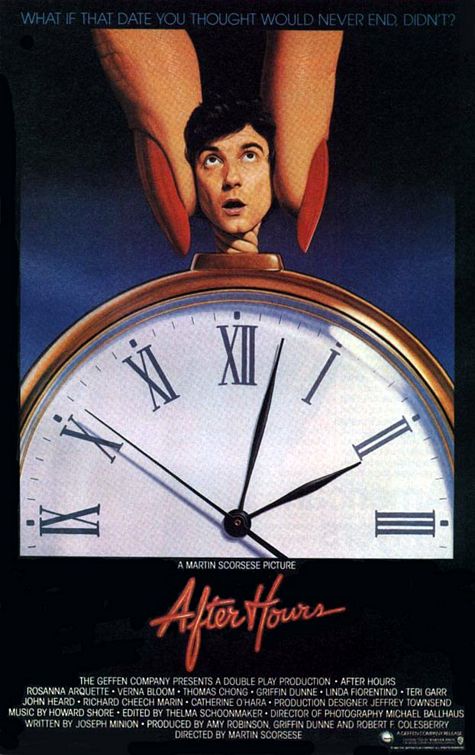
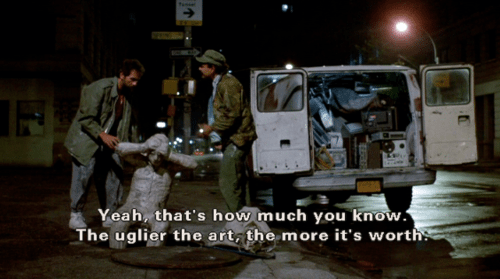
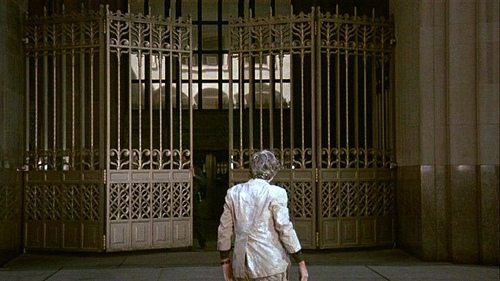
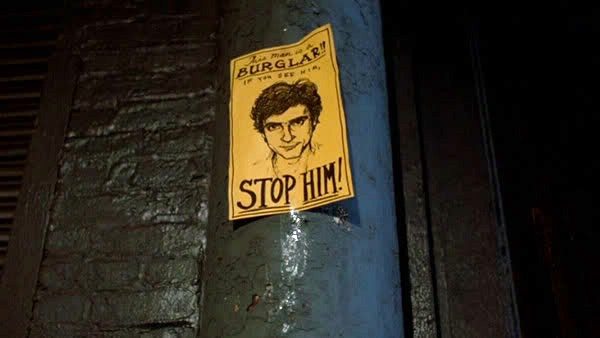
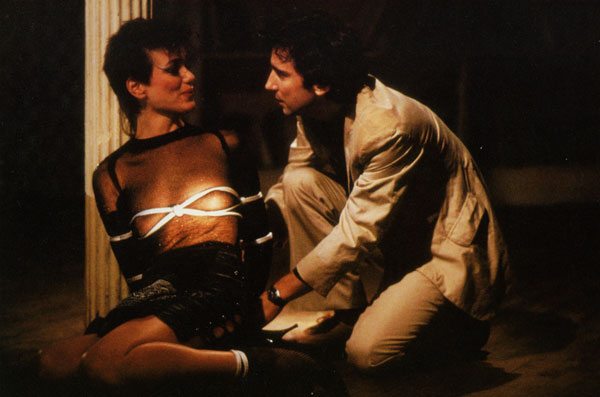
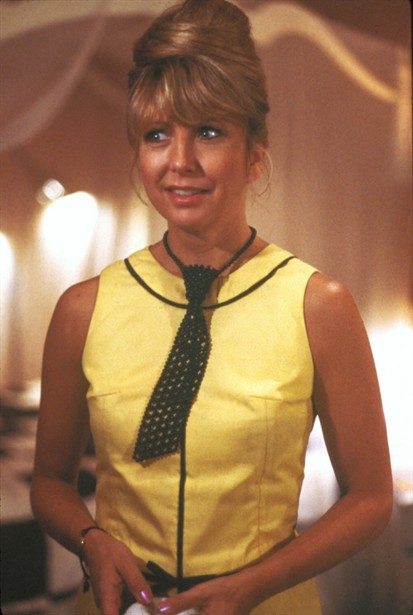
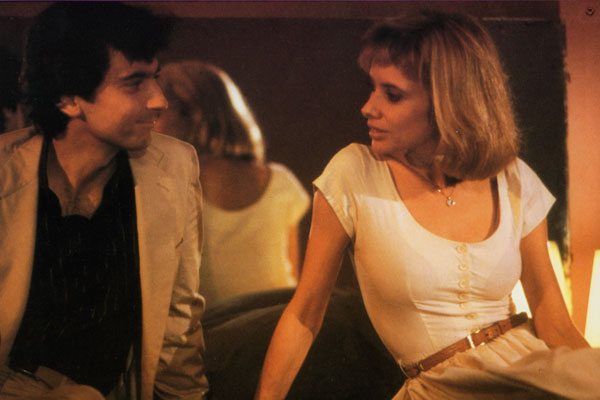
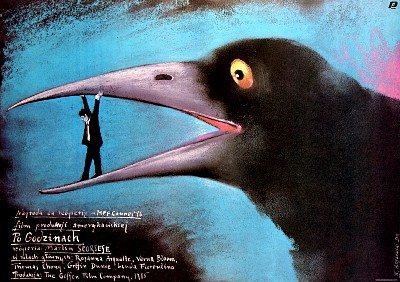
While not his best movie (tough to beat “Raging Bull” and “Goodfellas”), “After Hours” is easily his most unique film. And perhaps his most entertaining. And funniest. So, there’s that.
I will say there IS one frustration a New Yorker might have with it, and it’s a very basic one: WHY NOT JUST WALK HOME?? It’s only 75 blocks. I’ve done longer late night walks on more than one occasion in my many years of living there (when cabs had vanished and the subways seemed too dark and frightening for my booze-fueled imagination).
But that’s a small detail. In fact, one could argue that in the mid-80s, walking that distance might’ve seemed unthinkable. Or it may have brought you through (the then still existent) Hell’s Kitchen. However, it would be easy to walk around those few blocks by cutting over to 7th or 6th Avenue to Central Park South.
And, of course, if Paul had simply walked, one might argue that we wouldn’t have a movie. I actually think you would’ve had a DIFFERENT movie. And one that might’ve even seemed more like a modern day, yuppie Epic of Gilgamesh-style voyage.
That said, it’s a wonderful dark comedy and is a strangely forgotten, underrated classic from an American film master working at the top of his game.
And holy crap is Rosanna Arquette smoking hot in this flick. I mean, HOLY BEJEZUS!
I moved to New York because of this movie. And I desperately hoped to find my own Marcie.
And Lord knows, I found more than my share. And I paid the price for it.
But ended up with equally awesomely bleak stories that have entertained my friends for many, many years since. And only some of them deal with random strippers jumping in my car at red lights telling me to “just drive!”
I also think the ending is perfect. But I think it’s pretty clear in its meaning. He’s a yuppy. A man who feels at home in his world of data entry, cubicles and printers. The longing, slow motion gaze he gives around the office proves this. Normally, work is portrayed as an oppressive place– a la “Brazil.” One that suppresses identity and individuality.
But not in “After Hours.” To a yuppie in the 80s, work WAS their identity. And, according to this movie, his home. The whole time Paul claims he “just wants to get home.” And at the end of the movie, he is. He’s at work. It’s a glorious moment. Both bizarre and hysterical. And frankly, bleak but honest. That’s who we were in the 80s. We were single people who had rejected the nuclear family for the individual pursuit for financial success. And this movie captures that modern fairy tale dynamic perfectly. And in doing so, defines what made that strange decade perfectly.
Paul ends up infront of the opening, golden gates of his office, welcoming back into the safe world of print outs and green computer monitors. It’s where he belongs. He tried on various identities throughout the long night. But none of them fit. He’s Paul. A Yuppie. A hard worker. Competent. As bland and unassuming as his tan suit.
Which is probably exactly why it bombed so profoundly when it was released.
I am happy that sites like yours exist to remind people of movies like this. And for inspiring me to revisit one of the seminal films of my youth.
Thank you sir, for your kind words.
Well, yes, he could have walked. But remember it was pouring rain when his subway plan failed. Then hiding out from the rain in the bar the bartender told him he’d give him subway fare…and then so on. So he never really had a chance to simply start walking. There was always a seemingly better way at hand.
I don’t know about your take on the ending. At the beginning, those dreamy shots of him looking at the office have nothing to do with comfort. They’re about how monotonous and awful his life is. He snaps out of it having totally ignored everything Bronson Pinchot was saying, says, “I’ll be right back,” and we cut to him leaving work. He’s OUT of there. Then he experiences a totally surreal night, but winds up right back where he started. There is no escape. Which seems to me more about the human condition as a whole, and not just some comment on yuppie computer jobs.
It has admittedly been roughly 16 years since I last saw the movie. But it’s funny, because I always remembered those shots at work as loving and not bored. I thought that was the joke bGuess I need to revisit it and see if I agree with you.
Exactly why I wrote this post: it’s time to watch it again. You will be happy you did.
I think if you were to sum up the movie’s theme as simply as possible, it would be: You can’t win.
Which take on life is, to Scorsese, to me, to you, and to an admittedly all too small segment of the population, fucking hilarious.
never watched this, have been meaning to for ages, will have to get it now.
What are you thought on Bringing out The Dead? I’ve not watched it since it was released but I have had an itch to revisit it for a few months now.
i only saw Bringing Out The Dead when it came out too. i vaguely recall some nice moments, but it sure didn’t stick with me. might make for an interesting double bill with After Hours, though.
I have no idea if anyone will ever read this, since this was posted in 2012. But thank you for writing this piece.
I just watched “After Hours.” I’m 29. I had never heard of it before this week.
I was literally on my Playstation trying to figure out a movie to rent, and I came across the description. I didn’t watch a trailer, I just decided to buy it and see what I would get.
Based on the description, I thought this was going to be a wacky “Weekend at Bernie’s” type of movie. Boy was I wrong, and I’m SO happy to be so wrong.
This was a great movie. Loved it. It was a movie that seemed to be heading toward possibly being a romantic film, and it quickly devolved into the bizarre and macabre.
I’m not really sure what to say about this movie, other than I feel there’s so much to chew on and dive deep into–but it’s hard to know where to start. Everything from Marcie’s bizarre behavior (medication/cream for burns, but was she really burned…? Paul thought he saw burns which turned out to be a tattoo. I know she had a burn book, but why the cream?), to the “husband” in Turkey, to the reference of The Wizard of Oz no doubt being sort of the anti-parallel to Paul’s inability to be able to ever go home.
I even think, on a level that I have yet to really process or think deeply about, but the fact that gay people (and their connection/affection for one another) playing such a bold part in this movie was unique to me–you don’t really see that even today.
But I agree, this movie was haunting. I loved the pace. I was as freaked out and creeped out as Paul. I found it interesting that Scorcese decided to have Paul’s five o’clock shadow become more and more prominent as the film went on.
I also found that editing stood out to me. I assume it was intentional, to sort of have these portions of the movie have a pretty hard (almost jarring) cut (to a closeup or a reaction shot), and then another hard cut to return to the previous shot/continuing action. It reminded me sometimes of when you dream and how you sort of accept things that are a bit weird or out of place. You just sort of go with it, even though you know deep down “Hmm, that wasn’t *quite* right or normal.”
Of course, there are always going to be a couple odd moments…like, why didn’t Paul (upon leaving Marcie’s home the first time) not grab the $20 bill off the paper machie sculpture (he did it when he re-entered the apartment–interesting that the cops hadn’t come despite all the sirens we heard–but not upon originally leaving)?
Why did Paul make out with Marcie at the top of the stairs after the totally bizarre revelations by Marcie up until that point, only to smoke weed and create an excuse about the paper weights in order to leave the apartment in an effort to get home?
And as for the ending, I’m not too sure if I liked it or felt satisfied by it. It felt abrupt, and truly, I’m not sure any ending would have been perfect or wholly satisfying due to the unique nature of the movie. But all my “complaints” are minor–I really loved this movie. It sort of reminded me a bit of “Eyes Wide Shut,”–that haunting, dream-like aspect, as well as an overall feeling of mystery, dread, and paranoia as things continue to get weirder and more worrisome for the protagonist as the night pushes forward.
I’m really happy I downloaded this one, for sure.
Hi Mike.
Yep, we read you. Glad you liked After Hours! You might also want to check out The King of Comedy, another Scorcese film that defies easy categorization. Another suggestion is Something Wild.
We do our best to write up those films that you might otherwise miss; check out our Double Feature posts next time you’re looking for something unknown to download and let us know what you think.
We’re not only reading your comment, we’re telepathically influencing its very creation. long story.
Meanwhile, yes to all things suggested by Mr. Evil Genius.
As to some of your questions, Paul makes out with Marcie because–wait for it–he wants to get laid. That’s why he came out there so late. He’s not going to let some weird “surrender Dorothy” moments get in the way of that.
but the book of burns, the rape story, the fake weed…that’s when he’s had enough. as for the $20, i think it’s just where his head’s at. the first time, stealing their money doesn’t occur. by the second time, i think he feels it’s his right to take it.
the editing is great, yes. those moments such as when they’re on the bed and she’s talking about the rape. the camera whip-pans to the window, then cuts back to the two shot. it creates a tense mood. and of course the fade out/fade in moments, such as Paul running up the stairs, which creates a dream-like mood.
truly a strange and unique movie.
Hey I just watched the film and couldn’t agree more with what you wrote. There is something so strange and unique about this film that stands apart from his other work.
Also another thing I noticed while watching this was the similarity to Stanley Kubrick’s Eyes Wide Shut. This film must have inspired the look and narrative structure for Kubrick’s film in which you see Bill Hartford (Tom Cruise) undertake a similar nighttime voyage in New York in a sort of quasi dream like nightmare.
I’d never thought to compare it to Eyes Wide Shut. But yes, there is a similar nighttime-journey-through-the-city vibe in that. And Kubrick was well known as a movie obsessive. Perhaps he loved After Hours too.
I just watched it again.
That you have.